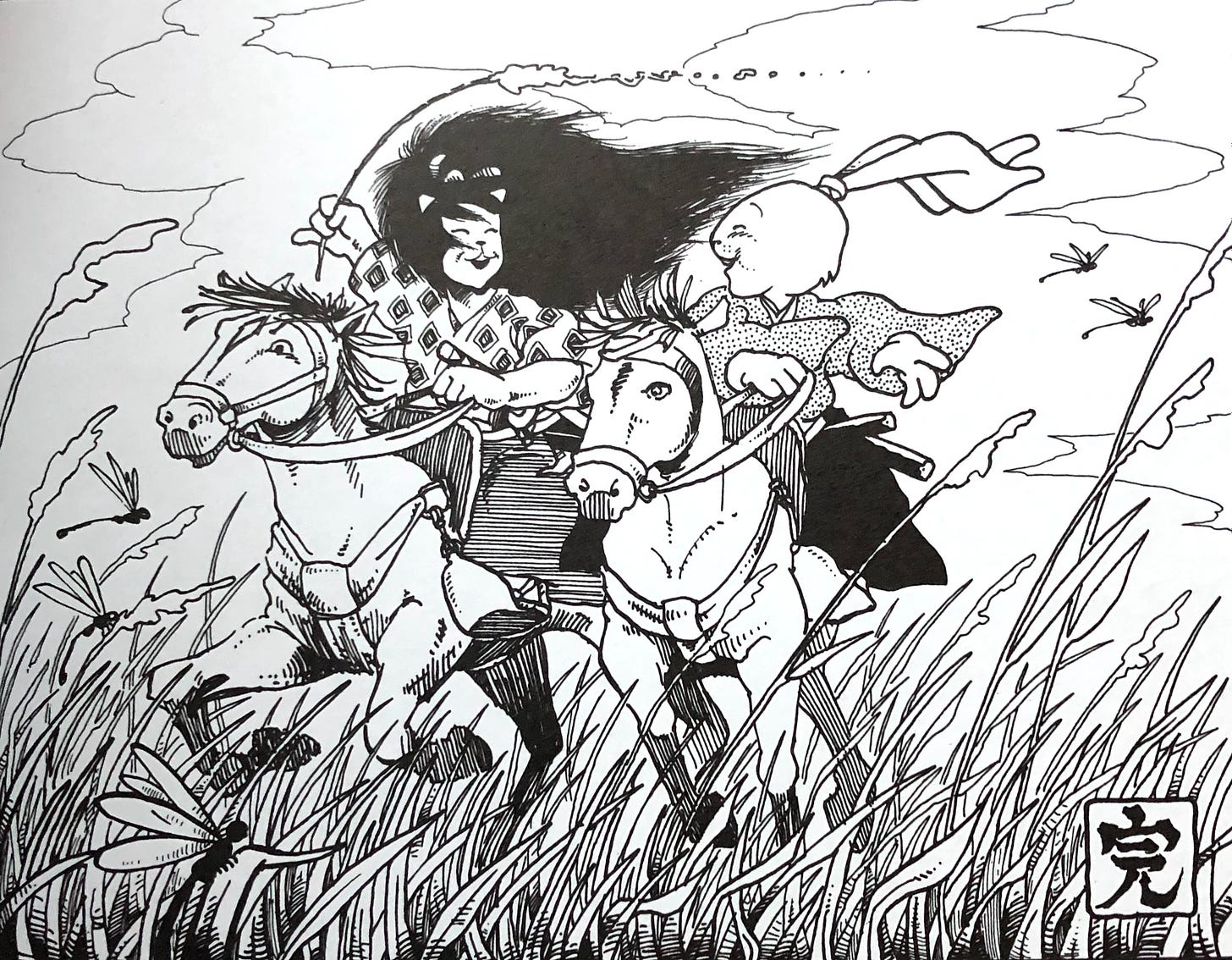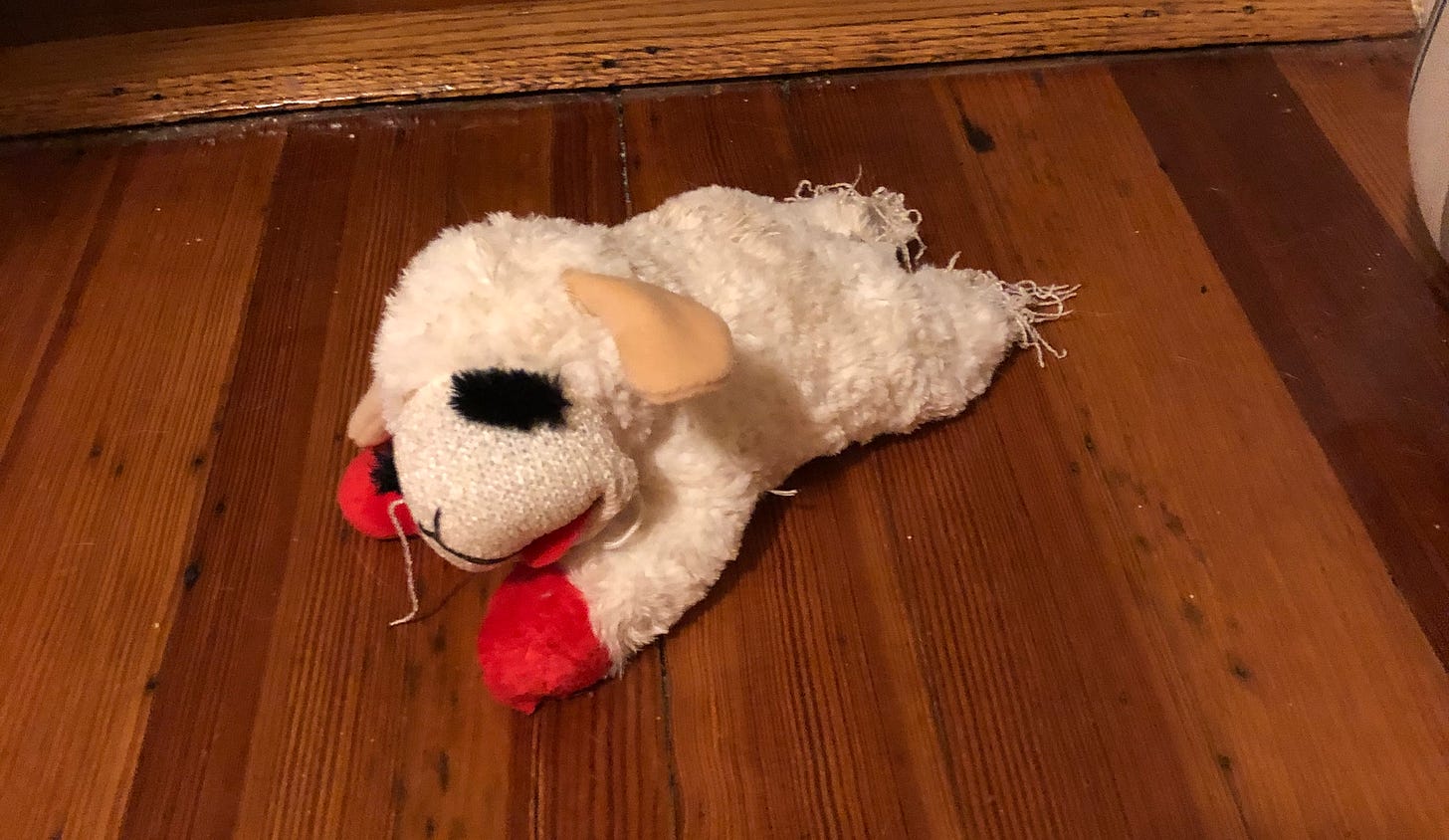
Usagi Yojimbo, Stan Sakai, 1987
Someone asked me recently who some of the leaders are in the climate change field and it was hard to think off the top of my head. I was like, oh, I don’t know and named some scientists, a couple donors, and some writers I like. Then I kind of snapped out of it and remembered all these amazing people like Rhiana Gunn-Wright, Varshini Prakash at Sunrise, Angela Adrar at Climate Justice Alliance.
But ever since that phone call, the idea of who our climate heroes are has been really bugging me. It struck me as part of a major problem in the climate movement especially pre maybe 2015?—that people were struggling to see themselves in the issue or in the people working to solve it.
This seemed like a good topic to touch on in the week that Jay Inslee dropped out of the Democratic primary, and yet, Tom Steyer remains. I really like Jay Inslee—he’s a public servant who’s been walking the walk for years, and his campaign was a noble effort as he had little chance of winning but saw an opportunity to elevate climate in the race.
On the other hand, when hedge fund billionaire and major climate donor Steyer joined the race, I had the similar close my eyes and exhale slowly while shaking my head response that most people did. A lot of people were pointing out all of the different ways he could use $100 million in campaign money on climate solutions instead, while having gut reactions that billionaires are basically the worst. Which both are certainly true, but I was also thinking ah shit what if it actually sort of works and he becomes this big billionaire climate guy jumping into the national spotlight.
I tweeted something about this and someone responded, yeah but he should do this other stuff with his money instead, so I guess I didn’t do a very good job of explaining it. But the thing I’m getting at is, even if these wealthy and/or powerful dudes are coming out strong and railing against the climate crisis and even having an impact, I feel like we lose something important based on the sheer fact of billionaires taking center stage as climate heroes.
This is kind of a similar idea to what I was saying in the last newsletter about the importance of all of us having buy-in, but in this case it’s way more important because of the level of societal change needed on this issue. I’ve also written some stuff about Mike Bloomberg and how even though he’s given like a billion dollars to climate action, he’s also trashed climate activists and championed natural gas, which was it turns out surprise not such an awesome idea, all while elevating his own personal status as a climate leader. It’s not that donors or other elites for that matter don’t have an important role to play in climate change, but it has to be in service of a movement beyond them.
Because the danger is that billionaires as climate heroes not only run the risk of undermining more ambitious and democratic climate action, they also reinforce the idea that fighting climate change is a matter for people in suits or maybe patagonia vests and khakis sitting down behind closed doors. When nothing could be further from the truth.
All it takes to realize this is one conversation with someone fighting a pipeline on tribal land, or Latinx and Native workers in New Mexico organizing for renewable energy instead of oil drilling, or an 18-year-old getting arrested in DC, or people working on just disaster recovery in the South. Not to mention farmers, fishers, pretty much anyone feeling climate change in their daily lives.
I think these people are finally getting the spotlight as climate heroes, and it’s overdue. Their stories are where climate change lives and breathes, and hopefully, where people can finally start to see themselves.
Podcasts
That is actually a good segue into a podcast I wanted to recommend this week, which is called Mothers of Invention. It’s hosted by former president of Ireland Mary Robinson and writer/comedian Maeve Higgins as they talk to climate justice leaders such as Gunn-Wright, policy lead on the Green New Deal, Navajo climate activist Wahleah Johns, or Siwatu-Salama Ra, a formerly incarcerated environmental and racial justice advocate from Detroit. The show is surprisingly funny of all things and spotlights people on the frontlines of climate change in ways you rarely see.

My dog has been pretty savage toward this lambchop toy I’m starting to feel bad for it.
Links
I’m making my way through the first wave of articles in the incredible 1619 Project. Aside from the fact that it covers history rarely taught in high schools and sometimes colleges, the stories are remarkable and remarkably told. You can buy a paper copy here for 6 bucks if you want to let the NYT know you like it when they do good stuff and not dumb stuff.
A standout is Nikole Hannah-Jones’ powerful article about the history of black Americans fighting and often dying for the ideals of American democracy. “What if America understood, finally, in this 400th year, that we have never been the problem but the solution?”
A history of American Chinese food by way of the Crab Rangoon.
There’s a bunch of colleges and biotech startups in Cambridge but also the factory that makes the world’s supply of Junior Mints. “A spokeswoman for the company, which rarely communicates with the media or candy industry analysts, declined comment.”
As days get hotter in Phoenix, people are doing more things at night. And a writer laments the loss of cool summer nights to climate change.
Watching
Blown Away is this captivating reality show about glass blowers. Now and then someone’s sculpture in progress breaks and I like to imagine if I were on the show and that happened to me I would run around to all the other people’s sculptures and smash them and then run away.

Listening
I was going to write about this emo band I like but I don’t feel like it now and earlier today I was listening to this other band from Belgium that I guess is kind of emo still called Brutus. Brutus is badass and fronted by a drummer who sings which is always a good time. You can watch them play this good song here.
Reading
I read this book a couple years ago but I heard someone talking about it on a podcast yesterday and I was thinking about how good it was and wanted to recommend it. It’s called What is Populism? by Jan-Werner Müller and it’s about the wave of elected authoritarians like Trump, Berlusconi, and Marine Le Pen, who redefine “the people” in a one-sided way (not on my side, not the people) that secures their corrupt power. Short and accessible, it offers clarity on a global phenomenon that our own political hellscape is a part of.
The weather has been awful here and I told my therapist, “Yesterday I fell into a complete rage just because it was so humid and some flies got into the house.” He kind of nodded and said, “Well, humidity can be difficult,” which I appreciated.
Whatever your own personal version of humidity is, I wish you the best in overcoming it. Remember, it usually doesn’t last forever.
Tate


